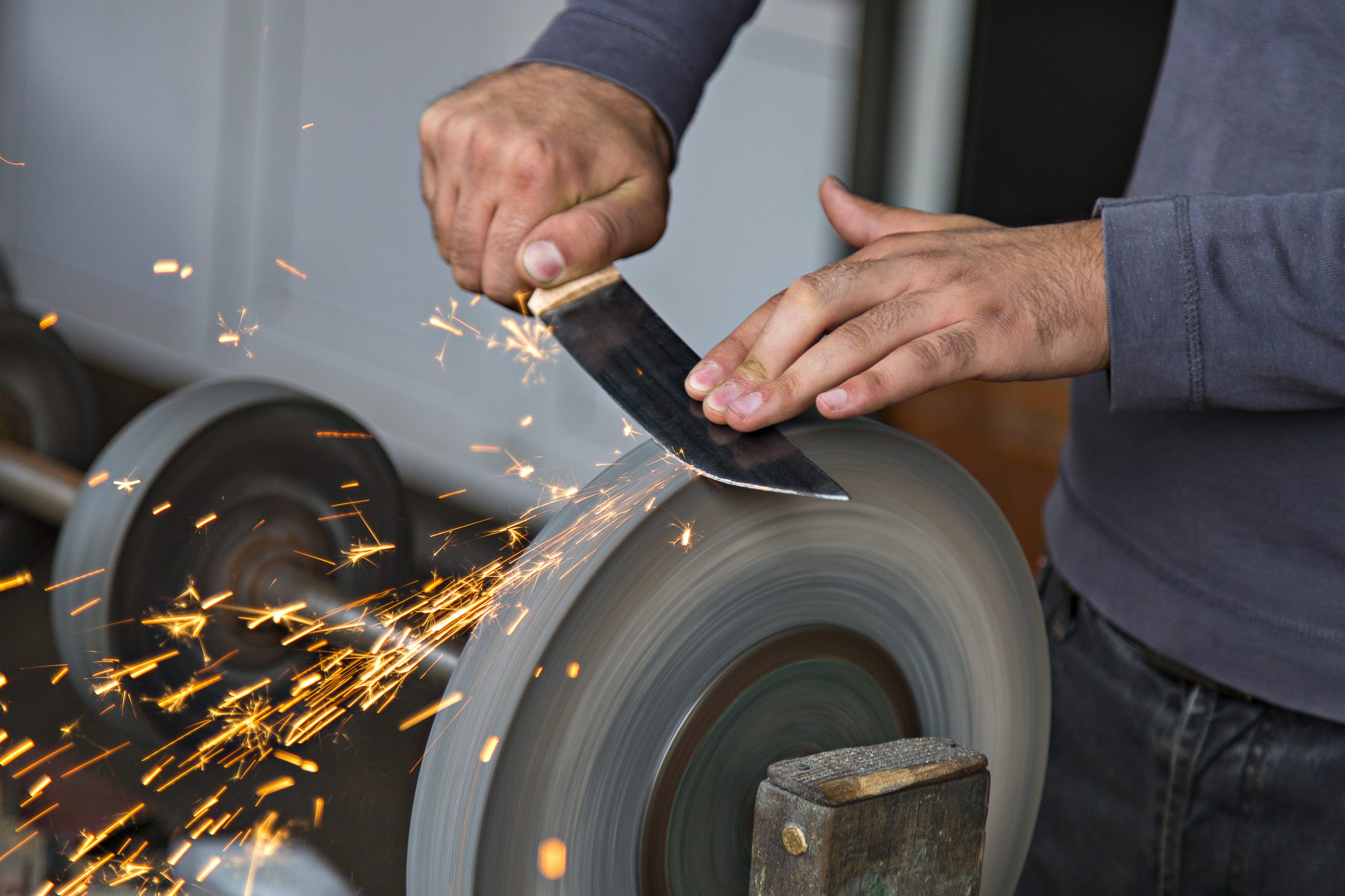Last Updated on January 27, 2023 by admin_hunter
There are many reasons to own a pocket knife, but all of those reasons are irrelevant if the blade is dull. If your pocket knife is dull, fear not! There are many different ways how to sharpen a pocket knife, and you won’t need more than a beginner’s knowledge to do so.
Knife sharpeners come in many different shapes and sizes. But the most basic, and perhaps most accessible, tools you will need are lubricant and a sharpening stone. Depending on their knife’s blade and size, people will get different sharpeners to fit their knives. But you shouldn’t need more than a simple sharpening stone when it comes to a standard pocket knife.
The Process of Sharpening Your Knife
The process of sharpening your knife can seem intimidating. But in reality, there is only a little bit of practice needed before you get the hang of it. Here’s the process in four steps.
Finding Your Angle
Before you begin to sharpen, you’ll want a clean slate to work with. Make sure you’ve wiped down both your pocket knife and your sharpening stone. While cleaning your blade, now would be a good time to note your knife’s edge angle, also known as the edge bevel.
The edge angle of your knife significantly impacts not just the sharpness of your blade but also the durability. It is recommended that your pocket knife is sharpened at a 10- to 15-degree angle. This makes your knife sharp enough to cut through basic materials and durable enough to last you some time.
Choose Your Stone
Like pocket knives, there are multiple sharpening stones-also known as Whetstones-to choose from. Each stone has its pros and cons, and ultimately your choice should boil down to whichever stone you find suits you and your needs.
If you are just beginning and are willing to spend a little more money for it, consider the diamond stone. The diamond sharpening stone is noted for how quickly it sharpens and for its high durability. This comes in handy, as it can be tiring on your arms to sharpen your blade.
However, if you are looking for an inexpensive option, then consider the oil sharpening stone. As the name suggests, you’ll need to lubricate the stone in oil before sharpening. The oil stone can be made up of different materials based on how coarse you would like the stone.
Lubricate Your Stone
Before you begin to sharpen your knife, it is highly recommended that you lubricate your sharpening stone. Mineral oil is the standard choice and can be found at almost any hardware or retail store.
While not necessary, lubricating the stone with mineral oil beforehand will prevent the stone from heating up too much from the friction of rubbing your blade across it. The mineral oil also prevents clogging of the pores in your stone, which can render the stone useless.
If you are in a pinch and have no access to a proper oil, water is the next best substitute. You ultimately just want to avoid sharpening on a dry stone. Using oil or water will extend the longevity of your blade.
Time To Sharpen Your Blade
Almost every sharpening stone has two sides, the rough gritted side and the fine gritted side. You will typically want to start with the rough side first, keeping the blade at a 10-15 degree angle. Then, run one side of your blade along the length of the stone facing away from you.
Think of shaving a very thin layer off a carrot with a vegetable peeler. Repeat this process about 10-12 times, then flip the blade over and do the same thing on the other side. Make sure you are consistent with the amount you have sharpened your blade on both sides. Keeping a close eye on your blade throughout the process can help ensure that both sides are even.
After you are finished with your stone’s rough grit side, repeat the same process on the fine grit side. You will want to check the stone and see if you will need to lubricate it again. While it is not always necessary to start on the rough grit side, it is recommended if your blade is exceptionally dull. If you just want a quick touch up, you can go ahead and skip to the fine grit side.
Keeping Your Knife Sharp
Now that you know how to sharpen your knife, it is also essential to understand how to take proper care of your knife. Keeping your knife in good shape can keep it from becoming dull prematurely. Good knife care will also prevent damage to the blade.
Keep It Clean
Wash your pocket knife frequently, especially if you have been using it to cut anything outdoors. Not only will this help prevent infection should someone accidentally be cut, but it is an excellent way to make sure no debris could damage your knife while sharpening it.
You can easily clean your blade with soap, water, and a towel. If you want to take sanitation a step further, you can wipe the blade down with rubbing alcohol.
Keep It Steady
When sharpening your knife, you should try your best to keep a steady hand. Improperly sharpening the blade can cause damage over some time. When sliding the blade on the sharpening stone, take care not to smack the knife against the stone. Doing so can cause small dents and nicks in the blade.
Try to keep the blade at a consistent angle to avoid creating an uneven surface. Also, please avoid misusing your knife. For example, trying to saw through a piece of wood when your blade is not serrated can damage your knife.
Keep It Polished
Many people swear by polishing their knives. When you run your blade on the fine grit side of a sharpening stone, you are already polishing it in a sense. You can go a step further and hone your blade with a leather strop. A leather strop is a strip of leather made to help polish and remove the burr from your knife.
Taking good care of your knife while sharpening it and using it will result in a more productive pocket knife that can last you for a long time.

